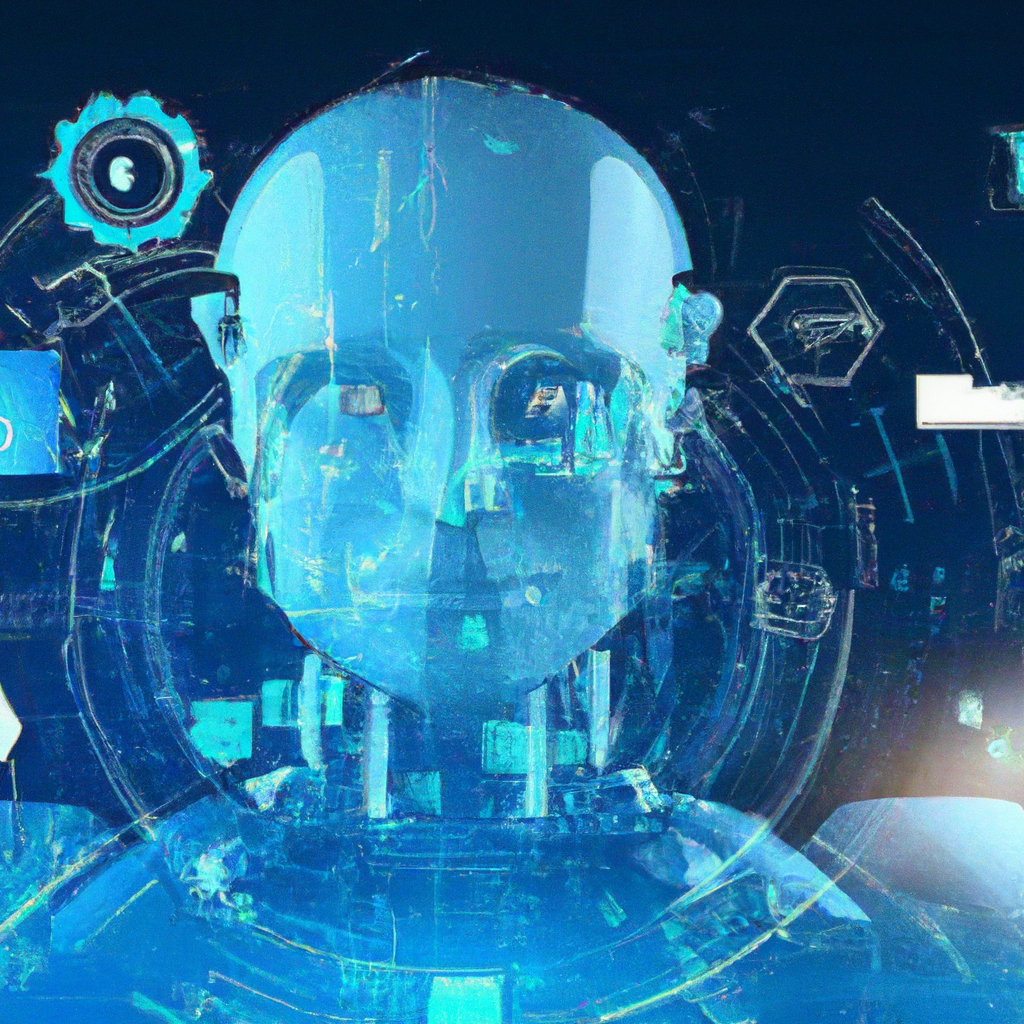Artificial intelligence has revolutionized the landscape of digital marketing, paving the way for innovative and efficient strategies. With AI, businesses can now analyze enormous amounts of data and gain valuable insights to create personalized campaigns, optimize customer experiences, and drive conversions. One notable example of artificial intelligence in digital marketing is the use of chatbots. These intelligent virtual assistants not only provide real-time customer support but also engage users in meaningful conversations, offering personalized recommendations and capturing important data for future marketing endeavors. With AI, digital marketing has become smarter, more efficient, and ultimately more effective in reaching and engaging target audiences.

Benefits of Artificial Intelligence in Digital Marketing
Enhanced Personalization
Artificial intelligence (AI) is revolutionizing digital marketing by enabling enhanced personalization. By analyzing vast amounts of data, AI algorithms can understand customer preferences, behaviors, and past interactions to deliver highly personalized experiences. This means that when users interact with digital marketing campaigns, websites, or apps, they receive tailored content, product recommendations, and offers that align with their individual needs and interests. This level of personalization not only improves customer satisfaction and engagement but also increases conversion rates and drives customer loyalty.
Improved Customer Engagement
AI-powered digital marketing tools and techniques enable businesses to improve customer engagement significantly. Chatbots, for example, have become increasingly popular in customer service as they provide instant and efficient responses to customer inquiries, 24/7. These virtual assistants use natural language processing and machine learning algorithms to understand customer queries and provide accurate and helpful information. As a result, businesses can achieve higher customer satisfaction rates and build stronger relationships with their audience.
Optimized Advertising Campaigns
One of the major benefits of AI in digital marketing is the ability to optimize advertising campaigns for maximum effectiveness. AI algorithms can analyze massive amounts of data to identify patterns and trends, enabling marketers to make data-driven decisions about their advertising strategies. This includes identifying the most promising target audiences, selecting the best ad placements, optimizing bidding strategies, and automatically adjusting campaign parameters in real-time. By using AI-powered tools like programmatic advertising, businesses can optimize their advertising campaigns to reach the right audience at the right time, leading to higher conversion rates and better return on investment (ROI).
How Artificial Intelligence is Revolutionizing Digital Marketing
Automation of Routine Tasks
AI is transforming digital marketing by automating routine tasks that were previously time-consuming and prone to human error. For example, AI-powered tools can automatically create and schedule social media posts, monitor and respond to customer queries, and analyze and report on marketing performance. This automation eliminates the need for manual intervention in these repetitive tasks, freeing up marketers’ time to focus on more strategic activities and ultimately improving overall efficiency.
Predictive Analytics
Another way AI is revolutionizing digital marketing is through predictive analytics. AI algorithms can analyze large volumes of historical data to identify patterns and make accurate predictions about future customer behavior. This allows businesses to anticipate customer needs, preferences, and churn risks, enabling them to tailor their marketing strategies accordingly. By leveraging predictive analytics, marketers can optimize their campaigns, allocate resources effectively, and make data-backed decisions to stay ahead of the competition.
Chatbots and Virtual Assistants
AI-powered chatbots and virtual assistants are transforming the way businesses interact with customers. These intelligent conversational agents use natural language processing and machine learning to simulate human-like conversations and provide personalized assistance. Chatbots can handle a wide range of customer queries, provide product recommendations, offer support, and even complete transactions. Virtual assistants, on the other hand, can assist customers throughout their entire journey, from product search to post-purchase support. By leveraging chatbots and virtual assistants, businesses can provide immediate and personalized customer support at scale, enhancing the overall customer experience.
Enhancing Customer Experience with AI
Customized Product Recommendations
AI enables businesses to provide customized product recommendations based on customer preferences and behaviors. By analyzing customers’ past purchases, browsing history, and demographic information, AI algorithms can accurately suggest products that are most likely to resonate with each individual customer. This personalized approach not only enhances the customer experience but also increases the likelihood of conversion and repeat purchases.
Real-Time Customer Support
AI-powered chatbots and virtual assistants provide real-time customer support, 24/7. These intelligent agents can handle a wide range of customer inquiries, provide instant responses, and guide customers through the buying process. By eliminating the waiting time for customer support and ensuring prompt and accurate assistance, AI-powered customer support enhances the overall customer experience and increases customer satisfaction.
Seamless Shopping Experiences
AI technology, such as image recognition and augmented reality, is revolutionizing the way customers shop online. For example, AI-powered visual search allows customers to search for products by uploading images, making it easier to find exactly what they are looking for. Augmented reality (AR) technology enables customers to virtually try on products, visualize how they would look or fit, and make confident purchase decisions. These AI-driven features enhance the shopping experience, reduce the risk of dissatisfaction, and ultimately increase customer engagement and conversion rates.

Advanced Targeting and Segmentation
Behavioral and Contextual Targeting
AI provides advanced targeting capabilities by leveraging behavioral and contextual data. By analyzing customers’ online behaviors, interests, and preferences, AI algorithms can segment the audience into highly specific groups and deliver personalized marketing messages accordingly. Behavioral targeting allows marketers to reach customers who have shown specific interests or behaviors relevant to their products or services. Contextual targeting, on the other hand, ensures that ads are displayed in the most relevant online contexts, based on the content being viewed or the user’s search intent. These advanced targeting techniques enable businesses to reach the right audience with the right message, increasing the effectiveness of their marketing campaigns.
Lookalike Audiences
AI enables the creation of lookalike audiences, which are groups of people who share similar characteristics to a brand’s existing customers. By analyzing the data of existing customers, AI algorithms can identify patterns and similarities across various demographics, interests, and behaviors. The AI system then uses this information to identify and target new potential customers who resemble the existing customer base. This allows businesses to expand their reach and target highly relevant audiences who are likely to be interested in their products or services.
Predictive Customer Segmentation
AI-powered predictive analytics allows businesses to segment their customer base more effectively. By analyzing past customer data and identifying patterns, AI algorithms can predict customer behaviors, preferences, and needs. These predictions enable businesses to categorize customers into different segments based on their lifecycle stage, likelihood to engage, or purchasing habits. By leveraging predictive customer segmentation, businesses can tailor their marketing efforts with precision, delivering personalized messages and offers to the most receptive audience segments.
Improved Content Creation and Personalization
Data-driven Content Strategies
AI is revolutionizing content creation by empowering marketers with data-driven insights. AI-powered tools can analyze vast amounts of data, including customers’ preferences, interests, and interactions, to identify content themes, topics, and formats that are most likely to resonate with the target audience. This allows marketers to create content that is highly relevant and valuable to their customers, increasing engagement, and driving conversions.
Automated Content Generation
AI technology enables automated content generation, saving marketers time and effort. Natural language processing algorithms can generate high-quality content, such as blog posts, product descriptions, and social media captions, based on predefined templates or guidelines. Automated content generation not only speeds up the content creation process but also ensures consistency in tone, style, and messaging.
Dynamic Personalization
AI-powered content personalization goes beyond traditional segmentation by delivering content that is dynamically customized to each individual’s preferences and behaviors in real-time. By leveraging AI algorithms, businesses can create personalized landing pages, emails, or websites that adapt to the user’s interests, location, or previous interactions. This level of dynamic personalization significantly improves the customer experience, increases engagement, and drives conversions.
Optimizing SEO with AI
Keyword Research and Optimization
AI-powered tools can greatly enhance keyword research and optimization for search engine optimization (SEO) purposes. By analyzing search trends, competition, and user intent, AI algorithms can identify relevant keywords and topics that are most likely to drive organic traffic. Additionally, AI can help optimize on-page elements, such as meta-tags, headings, and content structure, to improve search engine rankings and visibility.
Semantic Search Optimization
AI-based semantic search optimization improves the accuracy and relevance of search results by understanding the meaning behind search queries. This allows search engines to deliver more precise and contextually relevant search results, enhancing the overall user experience. Semantic search optimization uses natural language processing and machine learning to understand the intent and context of search queries, ensuring that the content matches the user’s needs effectively.
Website and Content Optimization
AI-powered tools can analyze website data and content performance to optimize websites for better user experience and search engine rankings. AI algorithms can identify technical issues, such as broken links or slow loading times, and provide recommendations to fix them. Additionally, AI can analyze content engagement metrics, such as time on page or bounce rates, to identify areas of improvement and optimize content to better meet user expectations.
Utilizing AI for Social Media Marketing
Smart Social Media Advertising
AI is transforming social media advertising by enabling smart targeting, ad creation, and optimization. AI algorithms can analyze vast amounts of social media user data, including demographics, interests, and behaviors, to identify the most relevant target audience for each ad campaign. AI can also automatically create ad variations, optimize bidding strategies, and identify the most effective ad placements in real-time. This level of automation and optimization ensures that social media ads reach the right audience, leading to improved campaign performance and higher conversion rates.
Influencer Marketing
AI helps businesses identify and collaborate with relevant influencers for their social media marketing campaigns. AI-powered tools can analyze influencers’ social media profiles, content, and engagement metrics to determine their reach, credibility, and suitability for partnership. By leveraging AI in influencer marketing, businesses can identify the most relevant influencers to amplify their brand message, reach new audiences, and enhance their social media presence.
Social Media Analytics
AI-powered social media analytics tools provide businesses with valuable insights into their social media performance and audience engagement. These tools can analyze social media conversations, sentiment, and engagement metrics to identify trends, understand customer preferences, and measure the effectiveness of social media campaigns. By leveraging AI in social media analytics, businesses can make data-driven decisions, improve their social media strategies, and better engage with their target audience.
AI-Powered Email Marketing
Personalized Email Campaigns
AI enables businesses to create highly personalized email campaigns by leveraging customer data and behavior analysis. AI algorithms can analyze customer preferences, purchase history, and engagement patterns to deliver personalized product recommendations, exclusive offers, and relevant content in email campaigns. Personalized email campaigns not only improve open and click-through rates but also foster customer loyalty and drive conversions.
Automated Email Responders
AI-powered email responders provide instant and personalized responses to customer inquiries and support requests. These automated systems use natural language processing to understand the content of the incoming emails and provide accurate and helpful responses. By automating email responses, businesses can ensure timely and consistent customer interactions, enhancing customer satisfaction and saving valuable time for customer support teams.
Email Optimization
AI technology can optimize email campaigns by analyzing various factors, such as subject lines, send times, and content. AI algorithms can analyze historical email performance data, A/B test different variations, and determine the most effective elements for better engagement and conversions. By leveraging AI in email optimization, businesses can continuously improve their email marketing strategies and achieve higher effectiveness in their campaigns.
Measuring and Analyzing Performance with AI
Data Analytics and Reporting
AI-powered data analytics tools enable businesses to collect, analyze, and visualize large volumes of data for marketing performance measurement. These tools leverage AI algorithms to identify trends, patterns, and insights from complex datasets, providing marketers with actionable information. By effectively tracking and measuring marketing performance, businesses can optimize their strategies, reallocate resources, and make data-driven decisions.
Predictive Performance Analysis
AI enables predictive performance analysis by leveraging historical data to forecast future marketing outcomes. By analyzing past campaign data, customer behaviors, and other external factors, AI algorithms can make accurate predictions about future performance. This allows marketers to proactively adjust their marketing strategies, allocate budgets, and optimize campaigns for better results.
A/B Testing and Optimization
AI-powered A/B testing tools automate the process of testing different variations of marketing campaigns and identifying the most effective elements. By analyzing user behavior and engagement metrics, AI algorithms can determine which variations lead to better conversion rates or engagement levels. This eliminates the need for manual and time-consuming A/B testing processes, enabling marketers to iterate and optimize campaigns more efficiently.
Challenges and Ethical Considerations
Data Privacy and Security
AI-powered digital marketing relies heavily on customer data collection and analysis. However, this raises concerns about data privacy and security. Businesses must ensure that they have robust security measures in place to protect customer data from unauthorized access or breaches. Additionally, businesses must be transparent with customers about how their data is being used and obtain appropriate consent for data processing activities.
Transparency and Bias Issues
AI algorithms are only as good as the data they are trained on. If the training data is biased or lacks diversity, it can lead to biased or discriminatory outcomes. Businesses utilizing AI in digital marketing must ensure transparency in their algorithmic decision-making processes and be mindful of potential biases that could result in unfair practices or targeting.
Human Oversight and Accountability
While AI offers numerous benefits in digital marketing, there is still a need for human oversight and accountability. Businesses must ensure that AI-driven marketing strategies align with their core values and ethical standards. Human involvement is necessary to monitor the performance of AI systems, interpret the AI-generated insights, and make responsible decisions based on these insights.
In conclusion, artificial intelligence is revolutionizing digital marketing by enhancing personalization, improving customer engagement, and optimizing advertising campaigns. AI enables businesses to automate routine tasks, leverage predictive analytics, and utilize chatbots and virtual assistants for enhanced customer experiences. Furthermore, AI powers advanced targeting and segmentation, improved content creation and personalization, and optimization of SEO and social media marketing. AI also plays a crucial role in email marketing, measuring and analyzing performance, and addressing challenges and ethical considerations. As AI continues to evolve, its impact on digital marketing will continue to grow, providing businesses with innovative opportunities to deliver exceptional customer experiences and drive business growth.
